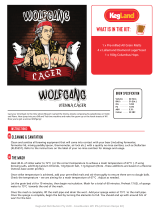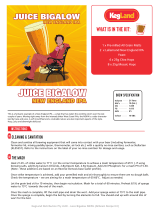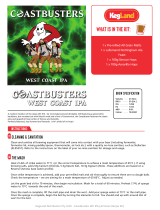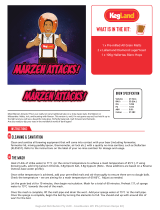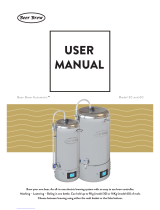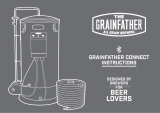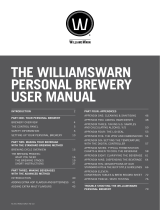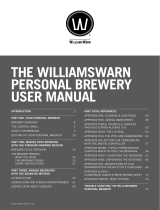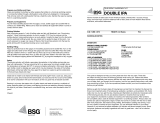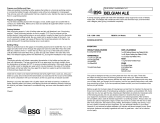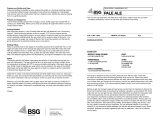
WHAT IS IN THE KIT:
42 litres
26 (Est.)
1.049
1.008
5.4%
8.1 EBC
Volume
IBU’s
OG
FG
ABV
Colour
BREW SPECIFICATION
INSTRUCTIONS:
CLEANING & SANITATION
Clean and sanitise all brewing equipment that will come into contact with your beer (including fermenter,
fermenter lid, mixing paddle/spoon, thermometer, air lock etc.) with a quality no-rinse sanitiser, such as StellarSan
(KL05357). Refer to the instructions on the label of your no-rinse sanitiser for dosage and usage.
1
THE MASH
Heat 20.85L of strike water to 71°C (or the correct temperature to achieve a mash temperature of 65°C ). If using
brewing salts, add 2.7g Calcium Chloride, 3g Epsom Salt, 3g Gypsum. Aim for a mash PH of 5.35. (Note - these
additions are based on a Reverse Osmosis base water prole).
Once strike temperature is achieved, add your pre-milled malt and stir thoroughly to ensure there are no dough balls.
Check the temperature – we are aiming for a mash temperature of 65-66°C . Adjust as needed.
Let the grain bed sit for 10 minutes, then begin recirculation. Mash for a total of 60 minutes. Preheat 7.79L of sparge
water to 75°C towards the end of the mash.
Once the mash is complete, li the malt pipe and drain the wort. Add your sparge water at 75°C to the malt pipe.
Once the sparge is complete, begin the boil by turning the elements to full. You should end up with around 26L of
wort for the boil.
2
KegLand Distribution Pty Ltd© - The Usual Hop-Specs XPA (All Grain Recipe Kit)
1 x Pre-milled All Grain Malts
4 x Lallemand New England Ale
Yeast
8 x 25g Hops*
*Hop selection diers
Juggernaut
A beautifully rounded XPA, with a subtle hint of sweetness from the toee malt that doesn't get in the way of
the giant hop burst!Pale golden in colour, this beer is sure to be a hit with your friends!
With your choice of hop, you can really express yourself, from tropical to classic.

THE BOIL
3
MY RATING:
APPEARANCE
TASTE
OVERALL
AROMA
1 2 3 4 5
EMAIL US 24/7
beer@kegland.com.au
BREW DAY QUESTION?
Our friendly sta are
ready to help!
KegLand Distribution Pty Ltd© - The Usual Hop-Specs XPA (All Grain Recipe Kit)
There are two boil hop additions for this recipe. Add 25g Hops*10 minutes
before the boil nishes (at 50 minutes).
Boil the wort for 60 minutes in total. Pay attention at the start of the boil to
avoid any boilovers. Once the boil has nished and the wort has dropped to
80°C, add 25g Hops* to the wort and steep for 15 minutes.
Aer 15 minutes, you are ready to transfer the wort. If using the No Chill
method, simply pump it directly into your clean and sanitised No Chill cube.
Otherwise, chill using your desired method and transfer to your fermenter.
4THE FERMENTATION
Ensure that your fermenter has been thoroughly cleaned and sanitised. If
using an airlock, half ll it with sanitiser at the correct dilution. Add the
cooled wort to the fermenter and pitch the yeast by sprinkling directly onto
the cooled wort.
If you are using temperature control, the ideal schedule for this beer is 18°C
for the rst 3-5 days, then raise to 20-22°C until fermentation is nished. If
you do not have temperature control, then try to keep your fermenter in an
area where the temperature will not exceed 20-22°C. The rst 24 hours aer
pitching the yeast are the most critical in ensuring you do not get
undesirable o avours from fermentation.
The absolute best way to ensure you get consistently great beer is to get a
small cheap/free fridge from Gumtree and make a fermentation chamber.
This can be done easily with an inexpensive temperature controller
(KL01946) and a heat belt (KL01953).
You just plug the fridge and heat belt into the temperature controller and put the fermenter in the fridge, dial in
the temperature and forget about it!
Note that if you are using a pressure capable fermenter you will get the best results at around 10-12psi. Allow
pressure to build up with a spunding valve 24 hours aer pitching.
6
5
Feel free to experiment with the dry hop - dierent times and temperatures will oen give dierent results.
For the best results, add the dry hops (50g Hops*) at the end of fermentation. If you are using a pressure capable
fermenter, then set the spunding valve to around 12psi aer adding the hops. The timing of the dry hop is
denitely something that you can experiment with.
(*Hop choice diers depending on chosen options).
Once fermentation is done, it is time to transfer your nished beer! Ideally, cold crashing for at least 48 hours will
give the best results before transferring.
To determine that fermentation has nished, check the gravity over three consecutive days. If it is stable across
three consecutive days then fermentation is done and the beer can be safely transferred to your bottles, cans or
keg. Do not transfer until fermentation is complete.
Bottling your beer: Please refer to our detailed beginners guide for bottling from a fermenter here:
https://www.kegland.com.au/blog/post/a-beginners-guide-to-bottling-homebrew
Kegging your beer: We would suggest carbonating and dispensing at 10-12 psi at 2°C for best results. Refer to
our detailed beginners guide for kegging from a fermenter here:
https://www.kegland.com.au/blog/post/how-to-keg-your-beer-a-basic-guide
Canning your beer: To transfer your nished beer into cans we would suggest kegging and carbonating at 11psi
at 2°C then transferring to cans. Refer to our detailed beginners guide for canning here:
https://www.kegland.com.au/blog/post/how-to-can-your-beer-a-beginners-guide
THE TRANSFER
THE DRY HOP
/

